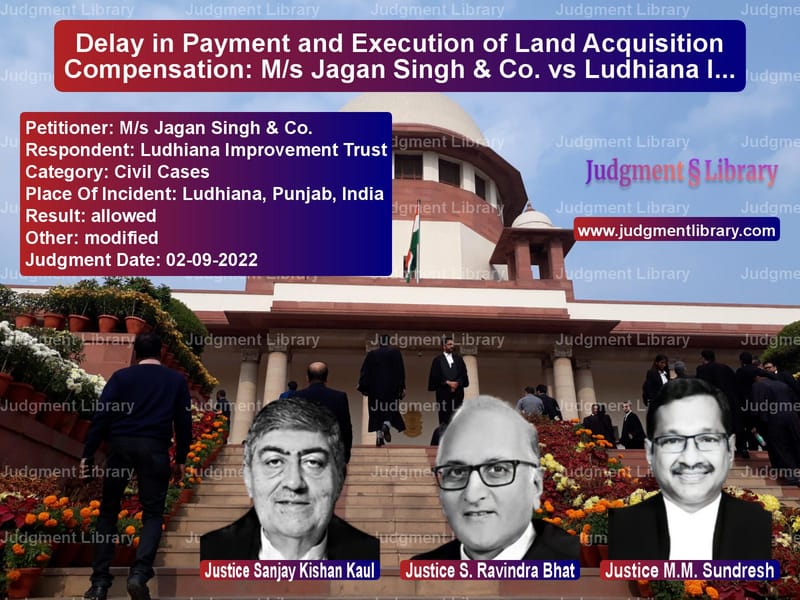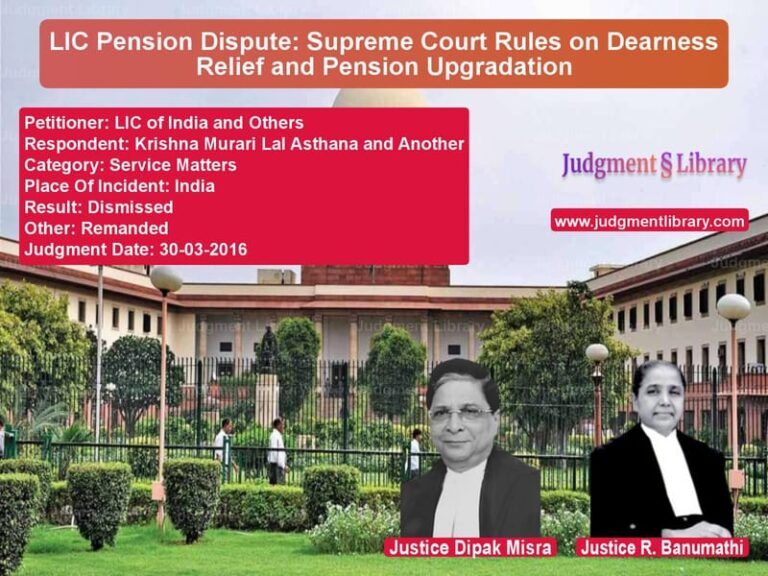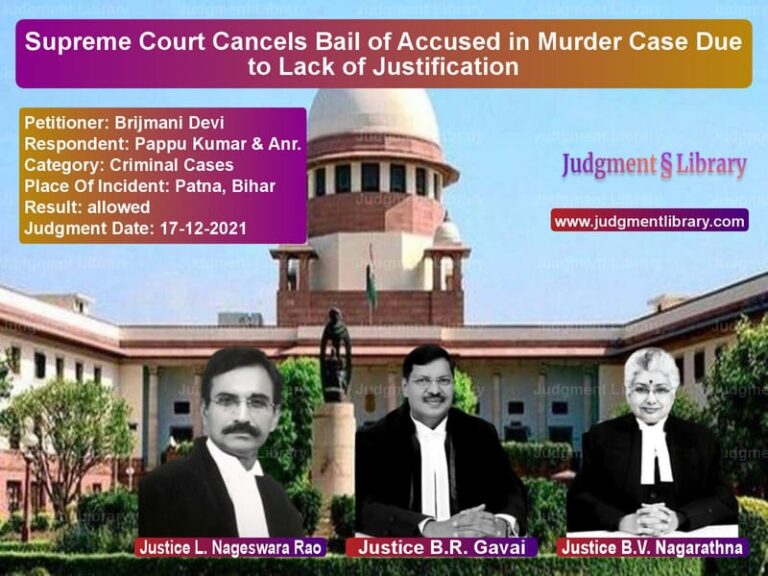Delay in Payment and Execution of Land Acquisition Compensation: M/s Jagan Singh & Co. vs Ludhiana Improvement Trust
The case of M/s Jagan Singh & Co. vs Ludhiana Improvement Trust revolves around the non-payment of compensation for acquired land under the Land Acquisition Act, 1984 (LA Act), spanning more than three decades. The land, measuring 8 Kanals and 11 ½ Marlas, was acquired by the Ludhiana Improvement Trust from the original landowners, who sought enhanced compensation. The case highlights the issues surrounding the delayed compensation payment, prolonged litigation, and the subsequent sale of the acquired property through auction, which led to disputes regarding the validity of the sale.
Background of the Case
Respondents no. 2 to 5 were the original landowners whose land was acquired by the Ludhiana Improvement Trust (LIT). The compensation determined by LIT was not accepted by the landowners, leading them to seek a reference under Section 18 of the LA Act. The Land Acquisition Tribunal enhanced the compensation to Rs. 4,27,068/- along with future interest at 9% per annum, but LIT did not pay the amount, continuing to hold the land. The landowners filed an execution petition in 1991, but the petition was dismissed as unsatisfied. A second execution petition was filed in 1991, which ultimately led to the auction of the property, which was purchased by the appellant.
Despite the auction, LIT filed an application under Order XXI Rule 90 of the Code of Civil Procedure to set aside the sale of the property, arguing that the sale process had not followed the correct procedure. The objections were dismissed by the Executing Court, and the sale was upheld. LIT further contested the sale in the High Court, which ruled that despite glaring irregularities, the sale could not be set aside. This decision was later appealed to the Supreme Court.
The Petitioner’s Arguments
The appellant, represented by counsel, argued that the auction was conducted in accordance with the law, and the respondent’s failure to raise objections during the execution proceedings was a clear indication of their neglect in pursuing their rights. The appellant contended that the auction was conducted transparently, and the land was sold in good faith. The appellant further argued that LIT had ample opportunities to object during the various stages of the execution proceedings but failed to do so. The auction sale, conducted in 1992, was finalized with the payment of Rs. 22.65 lakhs, and the appellant had duly deposited the amount.
The appellant emphasized that the Respondent Trust could not be allowed to set aside the sale after more than 30 years due to mere irregularities, which did not result in substantial injury to the respondent. The appellant pointed out that the Respondent Trust had not raised any objections at the time of the proclamation of sale or during the execution proceedings. The appellant argued that the Respondent Trust’s belated objections were merely technical and should not be entertained at this stage.
The Respondent’s Arguments
The respondent, Ludhiana Improvement Trust, represented by its counsel, argued that the auction sale was invalid due to significant procedural lapses, including the failure to issue proper notices and irregularities in the identification of the property. The respondent contended that the land in question was part of a development scheme and should not have been auctioned without following the prescribed legal procedures. The respondent pointed out that Khasra No. 271 was not mentioned in the sale proclamation, and the sale was conducted based on inaccurate details, which rendered the auction invalid.
The respondent further argued that the failure to comply with the provisions of Order XXI Rule 66 of the Code of Civil Procedure regarding the valuation and attachment of the property also contributed to the irregularity. The respondent contended that despite these procedural irregularities, the auction sale was confirmed, causing substantial injury to the respondent’s rights. The respondent sought the setting aside of the auction sale and requested the return of the property.
The Court’s Analysis
The Supreme Court examined the case with a focus on the compliance with the procedural requirements for the attachment and auction of the property. The Court noted that while procedural irregularities had occurred, the key issue was whether these irregularities had resulted in substantial injury to the respondent. The Court emphasized that the respondent had failed to raise objections at the appropriate stages of the execution proceedings, including at the time of the proclamation of sale and during the auction. The Court observed that the respondent had not even deposited the amount required under Order XXI Rule 89 for challenging the auction sale.
The Court also examined the issue of the identification of the property. The Court found that the property in question was clearly identified in the site plan, and the discrepancy in the Khasra numbers did not affect the validity of the sale. The Court noted that the appellant had made the payment in good faith, and the respondent’s objections were based on technicalities that did not affect the material aspects of the auction.
Final Judgment
The Supreme Court ruled in favor of the appellant, upholding the auction sale and dismissing the respondent’s objections. The Court held that the auction was conducted in compliance with the necessary legal procedures and that the respondent had failed to raise timely objections or take appropriate action to prevent the sale. The Court further emphasized that the respondent had not suffered substantial injury as a result of the auction, as they had not followed the prescribed procedure for challenging the sale. The Court upheld the concurrent findings of the Executing Court and the First Appellate Court and dismissed the revision petition filed by the respondent in the High Court. The Court also imposed costs on the respondent, quantified at Rs. 1 lakh, for the delay and the prolonged litigation.
Significance of the Judgment
This judgment underscores the importance of adhering to procedural requirements in execution proceedings, particularly when it comes to challenging auction sales. The Court’s decision highlights the need for parties to raise objections promptly and to follow the proper legal channels to challenge sales if they believe there has been a procedural irregularity. The ruling also reinforces the principle that a bona fide purchaser, such as the appellant in this case, should not be prejudiced by belated objections raised by the respondent after a lengthy delay. The judgment is a reminder that delays and procedural lapses should not be allowed to defeat the rights of parties who have complied with the legal procedures and acted in good faith.
Petitioner Name: M/s Jagan Singh & Co..Respondent Name: Ludhiana Improvement Trust.Judgment By: Justice Sanjay Kishan Kaul, Justice S. Ravindra Bhat, Justice M.M. Sundresh.Place Of Incident: Ludhiana, Punjab, India.Judgment Date: 02-09-2022.
Don’t miss out on the full details! Download the complete judgment in PDF format below and gain valuable insights instantly!
Download Judgment: ms-jagan-singh-&-co-vs-ludhiana-improvement-supreme-court-of-india-judgment-dated-02-09-2022.pdf
Directly Download Judgment: Directly download this Judgment
See all petitions in Contract Disputes
See all petitions in Property Disputes
See all petitions in Judgment by Sanjay Kishan Kaul
See all petitions in Judgment by S Ravindra Bhat
See all petitions in Judgment by M.M. Sundresh
See all petitions in allowed
See all petitions in Modified
See all petitions in supreme court of India judgments September 2022
See all petitions in 2022 judgments
See all posts in Civil Cases Category
See all allowed petitions in Civil Cases Category
See all Dismissed petitions in Civil Cases Category
See all partially allowed petitions in Civil Cases Category







